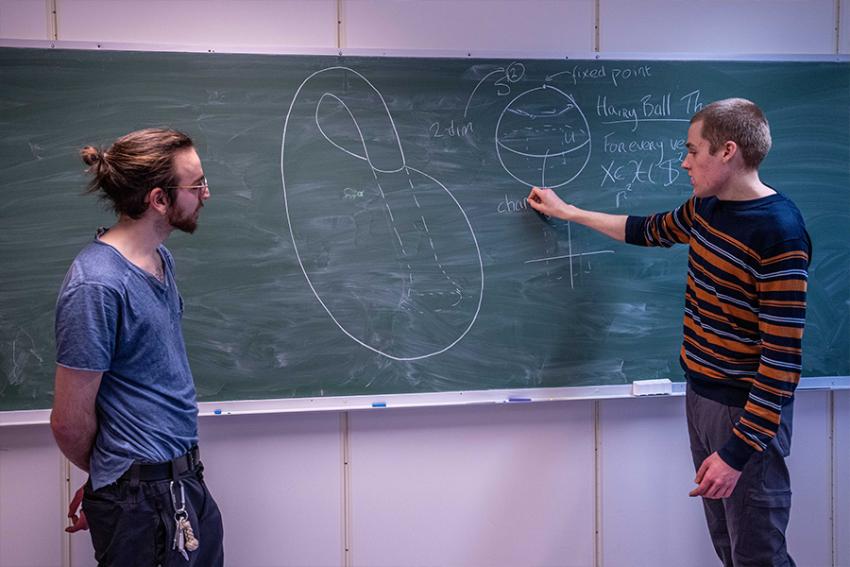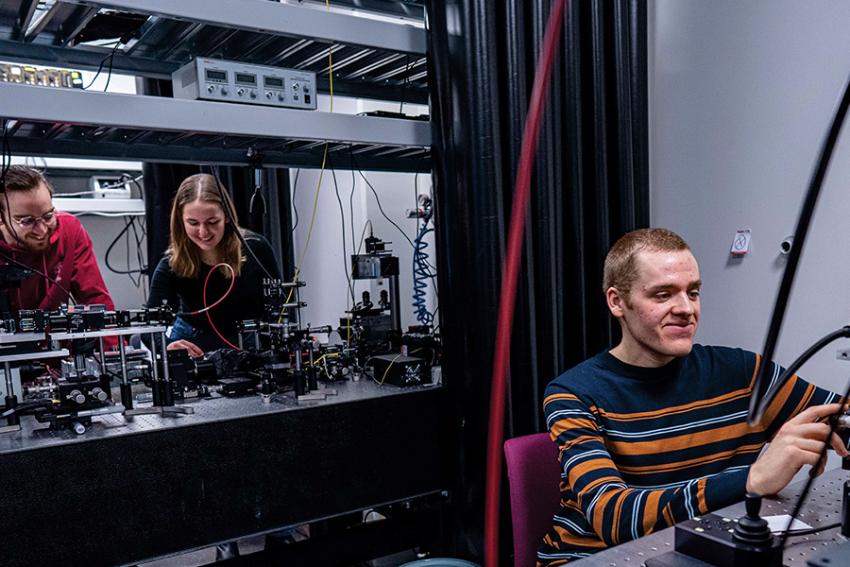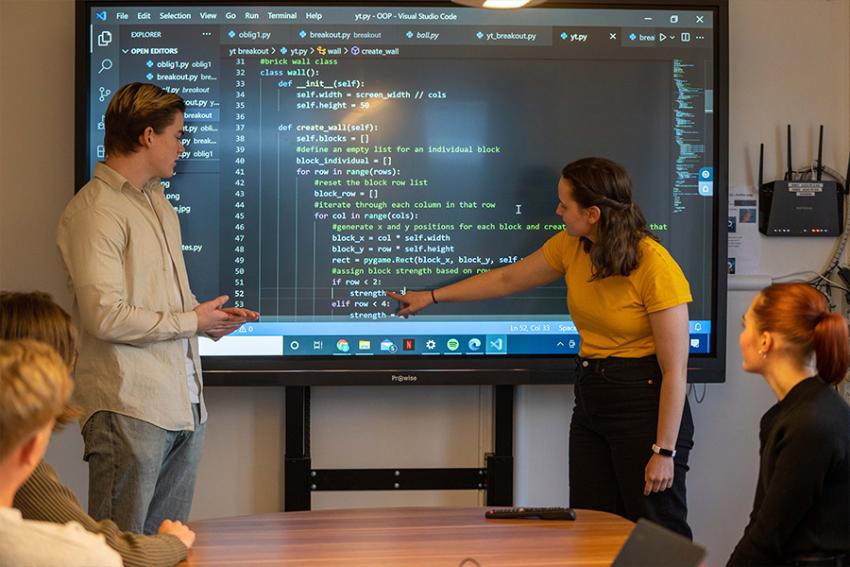Discover the world of molecular modeling and quantum chemistry - right from the Arctic. The Master in Computational Chemistry at UiT The Arctic University of Norway is an internationally oriented, two-year program delivered entirely in English. Here, your computer becomes the laboratory, to explore chemistry at the molecular and quantum-mechanical level. You will join an international research community, gain advanced skills in theoretical chemistry, and work with cutting-edge simulation software to answer fundamental questions in chemistry, physics and biochemistry.
This master’s program welcomes students from around the globe with a background in chemistry, physics, molecular sciences, mathematics, or informatics. Graduates are prepared for research careers in academia and industry worldwide - including in pharmaceuticals, materials science, catalysis, and biotechnology - or for doctoral study. With access to high-performance computing and in colse connection with academic advisors, you will be equipped to take on scientific challenges and contribute to sustainable innovation in molecular science.
The student is eligible according to UiT - The Arctic University of Norway's general admission rules:
- General admission requirements - Master
- A bachelor's degree (180 ECTS credits) in one of the natural sciences; Chemistry, Molecular Sciences, Mathematics, Physics, Informatics OR an equivalent degree following a programme of study of minimum 3 years (More information on bachleor's degree requirements)
- The bachelor's degree must contain a minimum of 30 ECTS in chemistry courses on bachelor level, and a minimum of 80 ECTS (or equivalent) specific to our master discipline
- Applicants must have a minimum grade average comparable to a Norwegian “C” (3.0) in the ECTS scale, see the UiT webpage for international admissions for more information on how the point average is calculated.
- International students from non-Nordic countries (except students with English as their mother tongue), must meet the Department of Chemistry's English proficiency with a recommended minimum score of 6.5 on each part of the IELTS test, minimum scores of 22, 22, 22 and 25 (reading, listening, speaking and writing, respectively) on the TOEFL test, C1 Advanced or C2 Proficiency level on Cambridge ESOL Examinations, or minimum C1 level on The European language certificate (telc)
Planned number of admissions fall 2026 (all applicants):
8 places
Applicants from Norway or Nordic countries:
Her finner du all informasjon knyttet til søking og opptak.
Applicants within EU/EEA/Switzerland (except the Nordic countries):
You will find more information about admission for EU/EAA applicants here
Applicants outside EU/EEA/Switzerland and the Nordic countries:
- Non-EU students must be prepared to pay tuition fees, more information here
- You will find more information about admission for Non-EU/EEA applicants here
- Nordic applicants: 4009
- EU / EEA / Switzerland applicants: 7101
- Non-EU/EAA applicants: 2010
Program description
Students will acquire advanced knowledge and hands-on skills in the theoretical foundations and computational methods used to model and predict molecular structure, properties, and reactivity. The curriculum emphasizes quantum chemistry, molecular mechanics, and the use of modern scientific software, enabling students to analyze complex chemical systems and gain deep insight into phenomena at the atomic and molecular level.
Throughout the program, students will develop the practical ability to carry out quantum chemical and molecular simulations, automate workflows, and interpret computational data using scripting and high-performance computing tools. The coursework and research activities are closely integrated with current scientific challenges, offering opportunities to specialize in areas like catalysis, drug discovery, spectroscopy, and materials science.
Graduates will learn how to assess computational results critically, explain and communicate scientific findings, and reflect on the broader implications of molecular modeling in chemical research and sustainable innovation. The program prepares students for doctoral studies or research careers worldwide, blending strong theoretical insight with practical, interdisciplinary problem-solving skills for academia and industry.
Learning outcomes
Knowledge
The candidate…
- has advanced knowledge of theoretical chemistry and the underlying principles of quantum mechanics and molecular modelling
- has in-depth understanding of modern methods used in computational chemistry, including wavefunction theory, density functional theory, and molecular mechanics
- is familiar with state-of-the-art software, algorithms, and computational strategies for modelling chemical systems
- has knowledge of how computational chemistry contributes to analysis and innovation in areas such as catalysis, drug discovery, spectroscopy, and materials science
- has insight into the role of high-performance computing in enabling advanced analysis in chemical research
Skills
The candidate…
- can independently select and apply appropriate computational methods to analyse molecular structure, properties, reactivity, and dynamics
- can perform quantum chemical and molecular simulations using modern computational tools
- can critically assess computational results and evaluate convergence, accuracy, and reliability of the data
- can interpret and explain the outcomes of simulations in terms of chemical theory and experimental relevance
- can write reproducible scripts, manage simulations on local and high-performance computing platforms, and automate workflows
- can carry out limited research projects in computational chemistry under supervision, and document findings in accordance with research ethical standards
General competence
The candidate…
- can communicate scientific ideas, problems, and solutions clearly in oral and written forms
- can critically analyse scientific literature and integrate knowledge from multiple sources to solve complex chemical problems
- can analyse and evaluate and reflect on the environmental, ethical, and societal implications of computational work in chemistry
- can contribute to interdisciplinary collaborations and apply computational chemistry in broader contexts such as sustainable development and technological innovation
Job prospectives
Graduates of the Master in Computational Chemistry program are well prepared for a wide range of career opportunities in both academia and industry. Many pursue doctoral studies in computational chemistry or related fields, building a foundation for research and teaching careers at universities and research institutes worldwide. The knowledge and skills gained also make graduates highly competitive for research and development roles in the pharmaceutical, biotechnology, materials science, and chemical industries.
Beyond traditional scientific research roles, graduates find opportunities in high-performance computing centers, software development for scientific applications, and consulting positions where computational modeling and data analysis drive innovation. Their expertise in molecular simulations and theoretical chemistry also positions them well for emerging areas such as sustainable chemistry, environmental technology, and rational drug design.
With a solid foundation in research and programming, you will be well-prepared for doctoral studies and leadership positions in research institutes or companies. Your capacity to critically evaluate computational data and communicate findings ensures you become an essential contributor to scientific progress and innovation on a global scale.
Degree Name
Master of Science in Computational ChemistryAccess to further studies
Completed Master's degree studies qualify for admission to PhD-programs in chemistry or other natural sciences, provided grades from the Master's and Bachelor's degrees are sufficient. PhD-studies in natural sciences (discipline chemistry) are offered at UiT The Arctic University of Norway.
Relaterte yrker
Studieplan
Language of instruction
The language of instruction and examination is English and all syllabus material is in English. The master's thesis must be written in English.
Teaching and assessment
This is a full-time campus-based study programme.
Courses are taught as classes or as individual curriculum. Various assessment methods are applied. Courses are assessed through oral or written exams, some through assessment of a laboratory or project report, and some as a combination of methods. Up-to-date course descriptions are available online.
As a Master´s student you become a member of the research group in Theoretical and Computational Chemistry at the Department of Chemistry, with an assigned thesis supervisor. You are advised to contact potential supervisors already in the first semester in order to start planning course work and the research project, which may be started in the first year. Throughout the research project, you may work closely in teams with doctoral students, post-doctoral fellows and senior scientists, and for some projects, local industry and enterprises.
To achieve the learning outcomes of the programme, students are expected to work on average at least 40 hours per week throughout the year on project and courses, including lectures, lab and seminars.
The Master´s program is structured such that the student can spend periods of their study abroad, preferably in the third semester. Student exchange can be formal courses, or visits to other labs and institutions to learn new techniques. Formal exchange programs with international Universities exist, (see the study program's web pages for more information). However, visits abroad are generally arranged individually, depending on what is relevant for the Master´s project, and on the collaborations of the supervisor. Courses must be approved in advance.
Studiesteder du kan utveksle til
Renate Lie Larsen
Seniorkonsulent, studieadministrasjon, Institutt for kjemi,
Bjørn Olav Brandsdal
Professor, Teoretisk og beregningsbasert kjemi, Hylleraas-senteretElias Haugseth
Førstekonsulent, StudieadministrasjonAndre studier du kanskje vil like
Følg @uitstudent på Instagram eller TikTok for å få et enda bedre innblikk i hvordan det er å studere på UiT. Her viser studentene fram sin studiehverdag, deler tips og nyttig informasjon, og du kan stille spørsmål om alt du måtte lure på.
Sjekk også @uitnorgesarktiske på Instagram eller TikTok for info om studier, jobbmuligheter og forskning.






